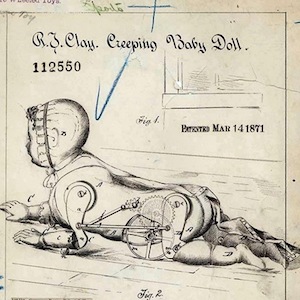North/Central America

Thanksgiving Newspaper Article
Thanksgiving was not uniformly celebrated until major efforts to nationalize it were undertaken late in the nineteenth century.

Creeping Baby Doll Patent
Strongly influencing the invention of Robert J. Clay's mechanized "Creeping Baby Doll" in 1871, were changing notions of childhood that fostered children's development.

Writing a Letter to Santa
Whether known as Saint Nicholas, Sinterklaas, Father Christmas, Kris Kringle, Babbo Natale, Christkind, Père Noël, Santa Claus ("Santa") or by many other names, this legendary gift-giver in European folklore and hagiography is well known around the world.

Carrying Native-American Babies
This watercolor (fig. 1) of a mother carrying her baby was painted c. 1585 by John White who explored the mid-Atlantic region with other Englishmen including Thomas Hariot.

Operation Babylift
These photographs were taken on April 5, 1975 on one of the Pan Am passenger planes that airlifted Vietnamese orphans and Amerasian children of American servicemen and Vietnamese women for Operation Babylift.

Little Eva, The Flower of the South
Published around 1853, Little Eva, The Flower of the South is an anonymously written children's story based on Eva, the enormously popular character in Harriet Beecher Stowe's anti-slavery novel, Uncle Tom's Cabin (1852).

Italian Mother and Baby
"Italian Mother and Baby" appeared in Jacob Riis's How the Other Half Lives: Studies among the Tenements of New York (1890). This image captures the misery of urban poverty as well as the tenacity of life. It is infused with unmistakable sentimentalism and symbolism.

Girls Making Snowman
Motivated by wartime hysteria and racial sentiments following the Japanese attack on Pearl Harbor on December 7, 1941, President Franklin D. Roosevelt issued Executive Order 9066 that ordered the removal of Japanese Americans on the West Coast to internment camps in the interior.

Last Day of School, Calgary
The children of various ages shown bursting through the doorway of the stone school building in Calgary, Alberta, have just been released for their summer vacation.

Piegan Play Tipi
The photograph, dated 1928, from the well-known ethnographic collection The North American Indian by Edward Edward S. Curtis, is a portrait of a young Piegan girl standing in front of a painted tipi, or conical tent.